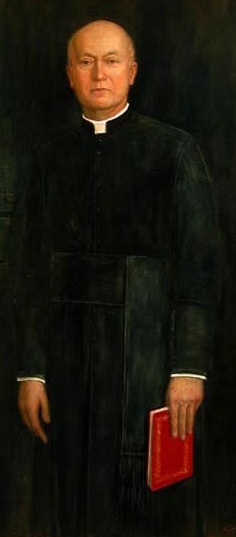
Saint Paul at His Writing-Desk
FROM THE PASTOR
by Fr. George W. Rutler
June 14, 2009
by Fr. George W. Rutler
June 14, 2009
The last Sunday of June will end the Holy Year of Saint Paul, commemorating the 2000th anniversary of his birth. The end, of course, should be the beginning of a new reverence for his teachings. In the liturgies of these weeks, an emphasis is on his two letters to the Corinthians. They have never been more timely. Corinth was a Greek city, located south of Athens in the area connecting the Peloponnesus to the mainland. In the arts and sciences it excelled and it produced some engineering marvels. It was full of energy, much of it uncontrolled, and money was the real god, although everything sensual was extolled. The temple of Aphrodite at one point housed one thousand cultic prostitutes and every sort of fantastic superstition was tolerated. In very many ways it was like New York City, and just as we say “If you can make it in New York you can make it anywhere,” the Romans who took over the city said “Not for everyone is the journey to Corinth.”
Saint Paul was a brave man to preach the Gospel there and it is no surprise that he had severe difficulties. Unlike the Galatians, whose caution about doing the wrong thing bordered on scrupulosity, the Corinthians were tempted to think “anything goes.” Their lush cosmopolitan environment, symbolized by the third architectural order which was the most elaborate in contrast to the Doric and Ionic, tolerated any kind of behavior and philosophy so long as it was aesthetically satisfying. They were heavily influenced by the Gnostic notion that the spiritual world had nothing to do with the material world. They compartmentalized their existence, thinking that they could engage in high abstract thoughts while living dissolute lives. A sacramental sense of creation was alien to the Corinthians, like some New Yorkers who prefer to speak of “spirituality” rather than Christianity, and who think they can be Catholic without confession, and “do what they want with their own bodies” while ignoring the sacredness of life, fornicating and cohabiting outside the marriage bond, and sanctioning perversions as “alternate lifestyles.”
After Saint Paul established the Church in Corinth in about 51, he wrote to them from Ephesus in Turkey, reminding them, sometimes with tears, that the human body is a temple of the Holy Spirit. He knew how hard it was for the Corinthians to be counter-cultural, as a Christian must be in a pagan environment. He was never discouraged, nor did he “lower the bar” by watering down doctrine like a false evangelist who would attract crowds by preaching a non-threatening generic Gospel. So he blesses the raucous Corinthian flock with a highly developed Trinitarian theology: “May the grace of the Lord Jesus Christ, and the love of God, and the fellowship of the Holy Spirit be with you all” (2 Cor. 13:14)
Painting: Rembrandt's Saint Paul at His Writing-Desk
Germanisches Nationalmuseum, Nuremberg
Germanisches Nationalmuseum, Nuremberg

No comments:
Post a Comment